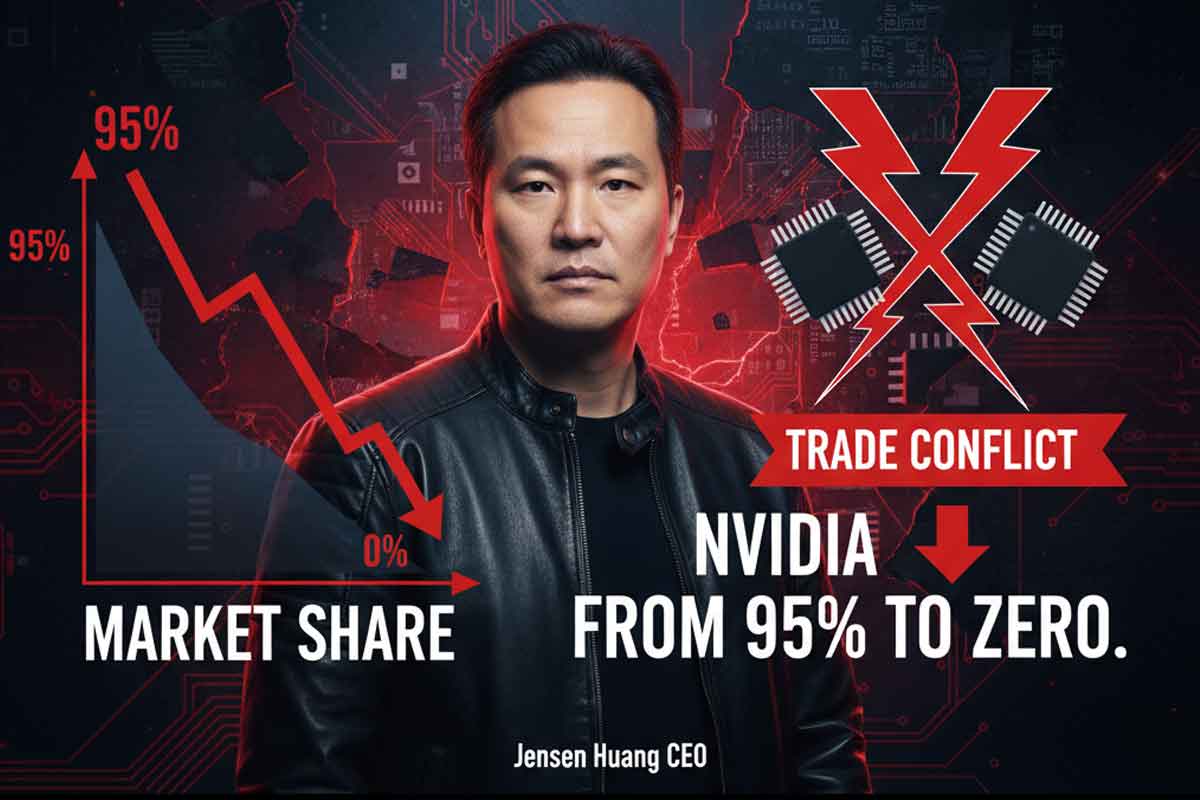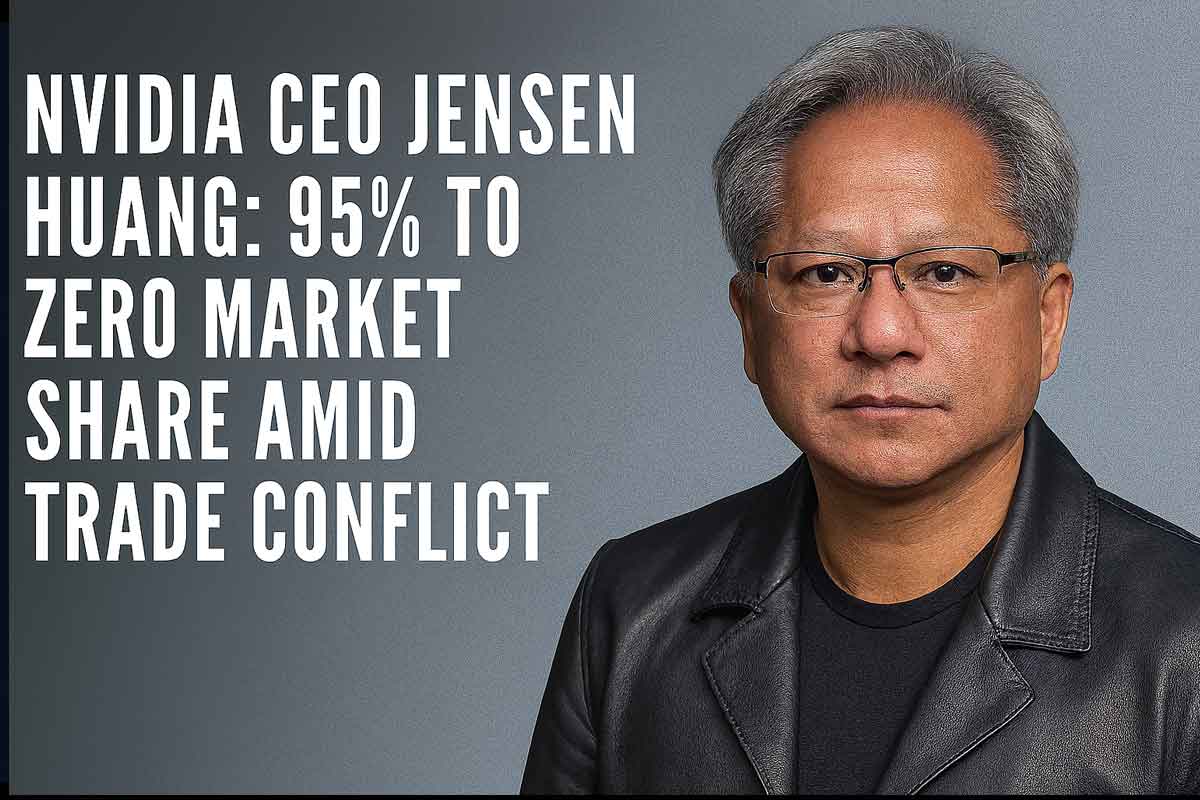The ongoing US–China trade conflict has created significant turbulence in the global semiconductor industry, and Nvidia CEO Jensen Huang has now confirmed that the company’s market share in China has fallen dramatically—from 95% to zero. The impact of the export restrictions, coupled with China’s move to reduce dependency on foreign AI chips, has left Nvidia effectively locked out of one of its most profitable markets.
About Nvidia and CEO Jensen Huang
Jensen Huang co-founded Nvidia in 1993 and has served as its CEO since the company’s inception. Under his leadership, Nvidia transformed from a graphics card manufacturer into a global leader in artificial intelligence, data center technology, and advanced GPU development. Huang is known for his forward-looking approach, emphasizing the fusion of AI, computing power, and sustainable innovation.
However, despite Nvidia’s global dominance in AI chips, geopolitical issues between the United States and China have become a critical threat to its business presence in Asia’s largest tech market.
News: Nvidia’s Market Share Drop from 95% to Zero
In his recent remarks, CEO Jensen Huang expressed concern over Nvidia’s sudden loss of business in China. According to Huang, the company’s share of the Chinese market for high-end AI processors, once nearly 95%, has now dropped to zero. He acknowledged that Nvidia’s advanced AI accelerators—such as the A100, H100, and the newer H200—are currently banned from export to China due to U.S. government restrictions on technology transfer.
“We went from owning 95% of the Chinese AI chip market to nothing,” Huang reportedly said, describing it as one of the most rapid market reversals in Nvidia’s history. The company now excludes China entirely from its short-term sales forecasts due to the restrictions.
Rise of Chinese AI Chip Companies
The U.S. export curbs, which were intended to limit China’s access to cutting-edge AI technology, have instead accelerated the growth of domestic Chinese chipmakers. Several new players, backed by government support and large investments, are filling the void left by Nvidia’s exit. Chinese firms are now developing homegrown GPUs and AI accelerators designed to compete with Nvidia’s flagship chips.
Huang himself noted that the export restrictions may have inadvertently strengthened Chinese innovation, as local companies have increased R&D spending to build alternatives. Analysts agree that this could lead to a more fragmented but competitive AI hardware landscape in the coming years.
China’s Directive to Tech Companies: No Nvidia AI Chips
Adding to Nvidia’s challenges, reports suggest that the Chinese government has instructed state-backed tech companies and cloud service providers not to purchase AI processors from U.S.-based firms, including Nvidia. This directive is part of China’s broader effort to ensure technological independence amid rising trade tensions.
The combination of export restrictions from the U.S. and purchase bans within China has created a complete shutdown of Nvidia’s high-end AI business in the country. For Nvidia, which previously relied on China for nearly a quarter of its data-center revenue, the blow is substantial.
Impact on Global Markets
- For Nvidia: Losing China means losing a key growth driver, prompting the company to redirect focus toward markets in the U.S., Europe, and the Middle East.
- For China: The ban is accelerating domestic AI chip development, potentially creating a new generation of self-reliant chipmakers.
- For Investors: The situation underscores how deeply politics and technology are now intertwined in global markets, affecting stock prices and supply chains alike.
CEO Jensen Huang’s Outlook
Despite the setback, Huang remains optimistic about Nvidia’s global opportunities. The company continues to expand production in other regions, including Taiwan, South Korea, and the United States. Nvidia is also collaborating with TSMC’s new facility in Arizona to ensure a more secure and diversified supply chain for its next-generation Blackwell GPUs.
Huang has stated that innovation, not isolation, will define the next phase of AI development. He believes that collaboration between nations, even amid trade tensions, is essential for advancing global computing and artificial intelligence.
Disclaimer
This article is based on publicly available information and statements made by Nvidia CEO Jensen Huang. The content is for general informational purposes and should not be considered financial or investment advice. Readers are encouraged to verify details through official company updates before making business or investment decisions.
FAQs
Q1. Why did Nvidia’s market share in China drop from 95% to zero?
Due to U.S. export restrictions on high-end AI chips and China’s directive barring purchases from Nvidia, the company lost access to the Chinese AI hardware market entirely.
Q2. Who is filling the gap left by Nvidia in China?
Several Chinese semiconductor companies have stepped up to produce domestic AI chips, supported by government funding and national technology programs.
Q3. What is CEO Jensen Huang’s response to this market loss?
Huang acknowledged the setback but emphasized Nvidia’s focus on expanding into new regions, enhancing chip production, and continuing innovation despite geopolitical challenges.



